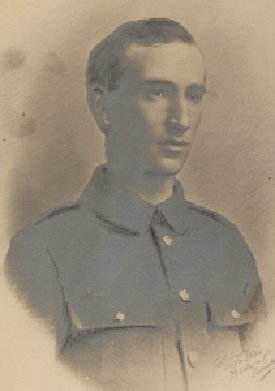Oliver Harry's Story.
Oliver Harry Hughes was born on 2nd October 1887, at the family home, 18 Queen Street, Cheadle, the son and youngest child of Thomas Parry and Amelia Emily Hughes. Oliver wasn’t baptised until the age of seven years and three months, by which time the family had moved to Romiley; the ceremony took place at the church of St. Chad’s, Chadwick.
Oliver was a young boy when the family returned to Wallasey and he was enrolled at St. Mary’s School, the first elementary school to be opened in Liscard under the auspices of the National Society. When it was erected, in 1839, it was originally connected to St. John’s Parish Church; but in 1894 it was transferred to St. Mary’s until it was closed shortly after the First World War.
After leaving school at the turn of the 20th century, Oliver did not follow in his father’s plumbing footsteps but served his time as a joiner, like his grandfather, William Hughes.
In his spare time, Oliver was a dedicated volunteer at Victoria Central Hospital; according to family legend, he was a real hit with the nurses with his quiet, good looks. Apparently, these pretty young things would find any excuse to call round to his house in Lathom Avenue, bringing messages on some pretext or other. And, of course, always a popular topic to discuss was the annual Wallasey Carnival, when the hospital participated in decorating one of the floats in the parade. Usually, this float would be dressed up to resemble a hospital ward, with Oliver cast in the starring role as the handsome, young doctor!
Oliver was also a keen member of the Territorial Army, along with two of his older brothers, Robert Stowell Hughes and Thomas Parry Hughes; when war was declared on the 4th August 1914 it was only nine days before he enlisted into the Lancashire and Cheshire Royal Garrison Artillery embodied Territorial Army. Consequently, he was almost immediately posted as Gunner 1050 Oliver Harry Hughes.
During his period of training and throughout his active service, Oliver wrote to his mother in Wallasey as often as he could. Sadly, none of the letters written to his mother have survived but Oliver’s niece Jessie, who lived with her, remembered it was she who replied to them all – young as she was – after Amelia dictated exactly what she wanted to say!
Two postcards sent by Oliver to his sister Mary (Polly), who had married Albert Beech and lived at 7 Lord Street, Stockport, have survived. One, dated 25th May 1916, has the message:
Broom Hill, Strood, Dear Pollie, Thanks for letter you say you for got the contrat the chief thing you for got was the stamp it was in side. This house now the museum was built in 1592. I have been through it. Remember me to Albert. Hoping you are both well. Oliver
The second card, written just four days later on the 29th May 1916, reads:
Soldier’s Club, London, Dear Polly, We had a good day yesterday, we were very tired, we took some waking up this morning I can tell you. We are going toward St. Paul’s this morning & Hyde Park afternoon. Oliver
This card gives the impression that he may have been on leave, convalescing, but he still had more than two years of harrowing fighting left before his end came, so cruelly close to the end of the war.
The last thing Oliver told his little niece, Jessie, before he left to fight in France was that he would never be cross with her again. Tragically he did not live to fulfil his promise, and on the 15th of October 1918, less than one month before the war came to an end, Oliver died on number 5 Ambulance Train while being transferred from a casualty clearing station to a base hospital. He had already been wounded twice before - and gassed - so his message to Pollie saying, “I have been through it.” was an understatement to say the least!
Oliver’s army records have survived but the writing is very faint and difficult to read. He was injured around April 1916 - one month before he sent the two postcards to his sister - although whether this was for the first time is unclear. Then later in the year, on the 22nd December, he was again wounded and taken to hospital with a head injury.
On the 7th January 1917 he was allotted Royal Garrison Artillery Regimental Number 136866 and was appointed Bombardier – a rank equivalent to corporal – five months later. By the time of his death, Oliver had been promoted, once again, to Signaler Bombardier, having qualified as a Signaller & Telephonist. The final entry, dated 16th October 1918, on the second page of the casualty form reads: died from Wounds (Gas) (Y.X.) and Wounds at no 5 Ambulance Train, Field, 15th October 1918.
Apparently the most widely reported and perhaps most effective gas of the First World War was mustard gas. It was introduced by Germany in July 1917 prior to the 3rd Battle of Ypres. The Germans marked their shells yellow for mustard gas hence they called it Yellow Cross – perhaps this is what the (Y.X.) means in the report.
Oliver’s death was reported in the Wallasey News on 2nd October 1918. Exactly one month later, on the 2nd November 1918, a short Condolence notice was printed in the Wallasey News:
Mrs. Hughes and family desire to thank all friends and neighbours for their kind expression of sympathy in their recent bereavement. 17 Lathom Avenue, Wallasey
Research by Helen Gill, granddaughter of Oliver’s niece Jessie.
Edited and abridged version of an article written for the Family History Society of Cheshire.




